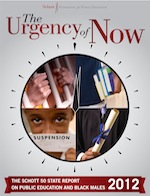 The Good News: A new report from the Schott Foundation for Public Education finds that the high school graduation for Black males has improved significantly over the past decade.
The Good News: A new report from the Schott Foundation for Public Education finds that the high school graduation for Black males has improved significantly over the past decade.
The Bad News: The high school graduation for Black males continues to lag the rate for White males by a whopping 26 percentage points.
The data shows that in the 2010-11 academic year, 52 percent of the Black males who entered high school four years earlier earned their diplomas. For White males, the four-year high school graduation rate was 78 percent. But the four-year graduation rate for Black males has improved by 10 percentage points from the 2001-02 academic year.
“ We have a responsibility to provide future generations of Americans with the education and the skills needed to thrive in communities, the job market and the global economy. Yet, too many Black and Latino young boys and men are being pushed out and locked out of the U.S. education system or find themselves unable to compete in a 21st Century economy upon graduating,” said John H. Jackson, president and CEO of the Schott Foundation for Public Education. “These graduation rates are not indicative of a character flaw in the young men, but rather evidence of an unconscionable level of willful neglect, unequal resource allocation by federal, state, and local entities and the indifference of too many elected and community leaders. It’s time for a support-based reform movement.”
We have a responsibility to provide future generations of Americans with the education and the skills needed to thrive in communities, the job market and the global economy. Yet, too many Black and Latino young boys and men are being pushed out and locked out of the U.S. education system or find themselves unable to compete in a 21st Century economy upon graduating,” said John H. Jackson, president and CEO of the Schott Foundation for Public Education. “These graduation rates are not indicative of a character flaw in the young men, but rather evidence of an unconscionable level of willful neglect, unequal resource allocation by federal, state, and local entities and the indifference of too many elected and community leaders. It’s time for a support-based reform movement.”
The report documents a huge disparity among the states in Black male graduation rates and the racial gap in graduation rates. In a handful of states, such as Arizona and Vermont, Blacks graduate at rates higher than Whites. In some states, including Nebraska and New York, the racial gap in the four-year graduation rates of Black and White males is more than 40 percentage points.
The full report, entitled The Urgency of Now, can be downloaded here.









I don’t get it. Why is Jackson so quick to conclude:
“These graduation rates are not indicative of a character flaw in the young men, but rather evidence of an unconscionable level of willful neglect, unequal resource allocation by federal, state, and local entities and the indifference of too many elected and community leaders. It’s time for a support-based reform movement”?
Why does he INSIST on blaming society at large for this gap?
When it appears self-evident that the priorities and values held by these young men–reinforced by deep-seated, maladaptive cultural memes–are the PRECISE and COMPREHENSIVE reason for their educational failure?
Until the establishment finally admits that cultural relativism “feels good” but is utterly at odds with true cause-and-effect, billions of tax dollars and meaningless, perennially ineffective measures will continue to be wasted on this culturally-determined education and socioeconomic gap.
Only truth can set us free.
The residue of slavery is more evident than ever before. Racism and unequal opportunities are a very real part of this equation. Where in you say the truth will set us free, acceptance of the deep affect of horrific crimes perpetrated against black people as a part of American culture and made light of by the majority culture can be a step in the right direction for correcting some of the many missteps against black people in particular but inclusive of many minority populations, the indigenous people as well.
Slavery and the the continued denial of equal opportunity has a lasting and exponential affect and the victims of these actions cannot be held responsible. Accountability without the ability to move forward is empty.
The issue of marginal academic performance among Black young men is a perpetual one. We must continue to view this crisis through multi-dimensional lenses. Societal ill, economic disparity across racial and ethnic groups, dysfunctional home situations, low self esteem, and the lack of positive black male presence; the list is endless. All these factors and more, are impeding their progress.
While I am pleased that there seems to be a slight improvement in the gains regarding the academic achievement of Black males, we need all hands on deck to experience monumental gains.
Education has historically had a political barracade that prevents the stakeholders from managing schools in a manner deemed best. Schools need money to operate-lots of it! So, let’s get more equity in our schools, hold teachers accountable for improved quality instruction, hire competent administrators to lead and manage our schools, and provide support services for our students who are struggling, and provide avenues for increased parental involvement.
This is not a Black male problem, it is a problem…period!
John E. Duncan Ph.D.